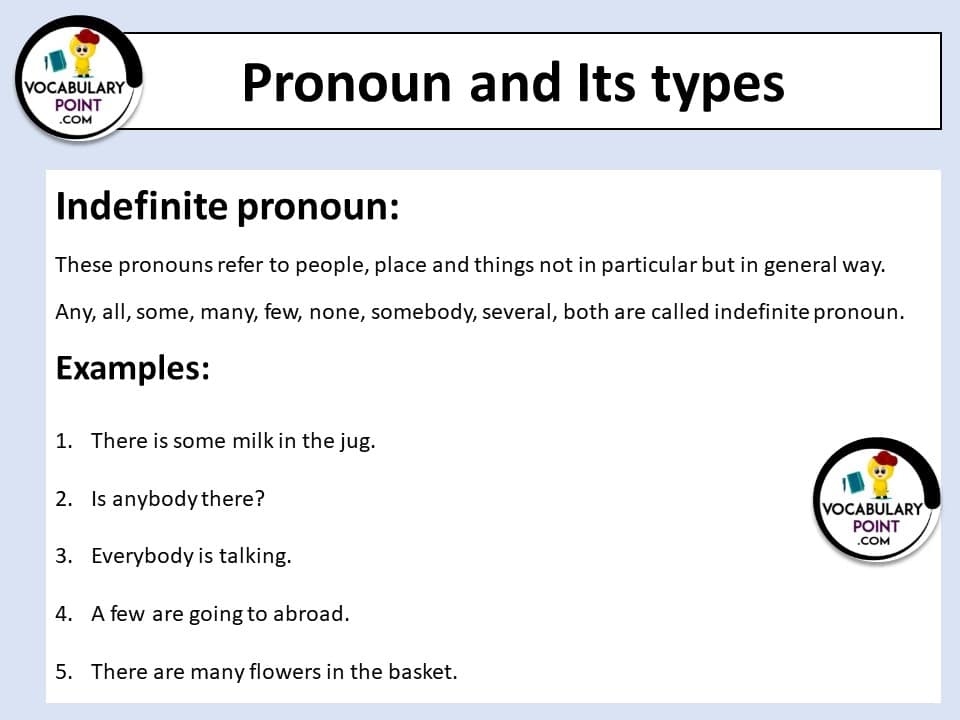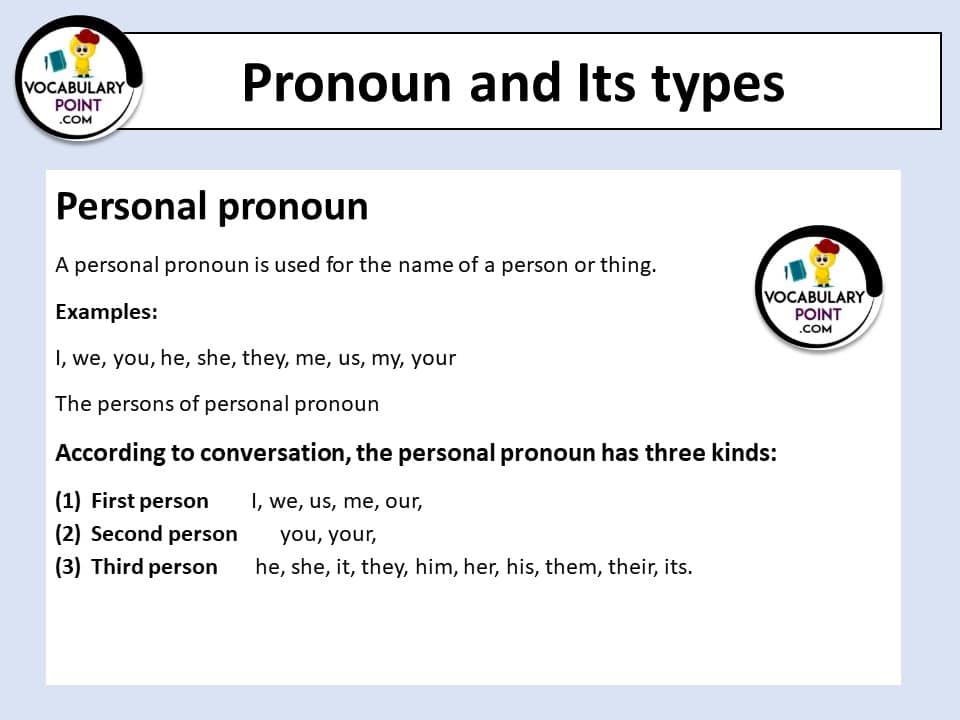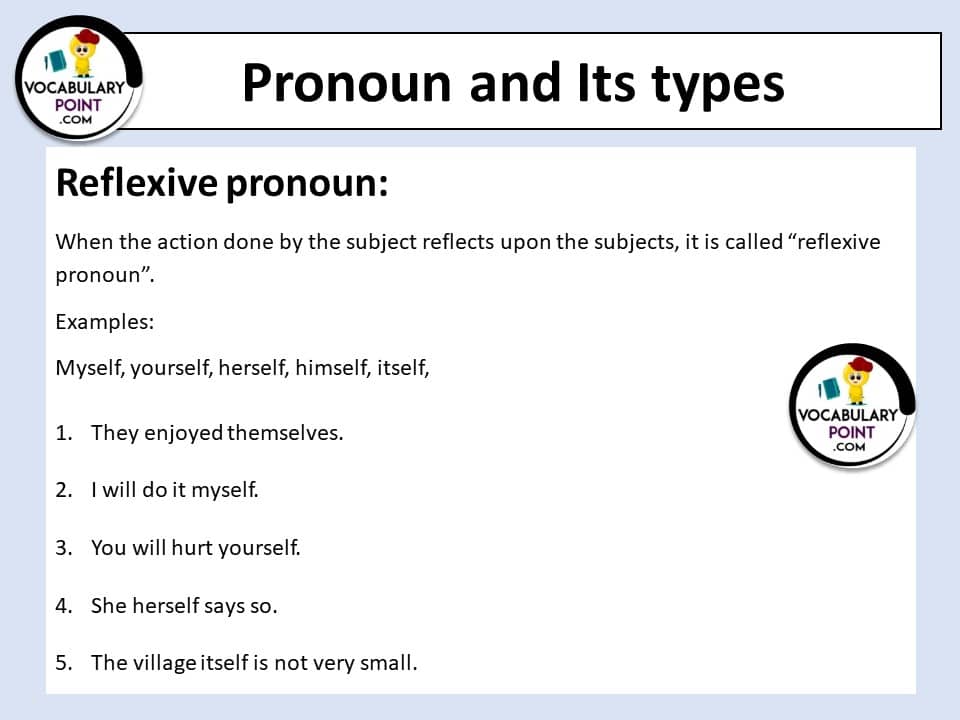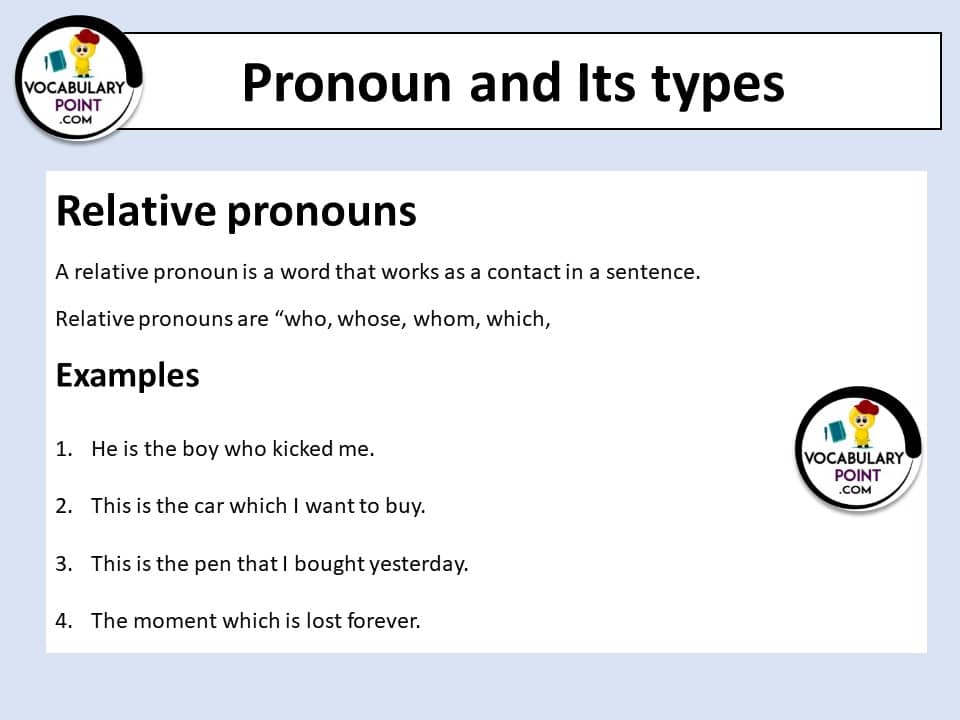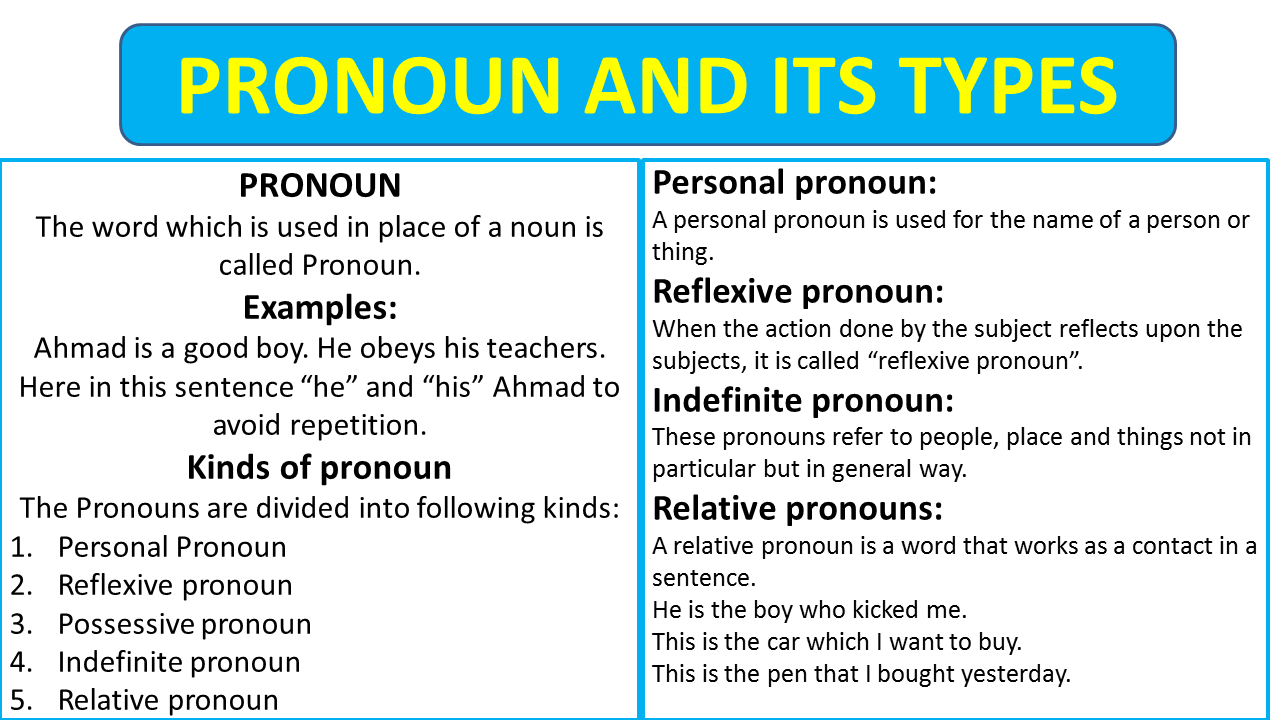Understanding the intricacies of language is essential for clear communication. Pronouns and nouns form the backbone of English grammar, facilitating efficient and varied expression.
What Are Pronouns?
Pronouns are words that substitute for nouns in a sentence. They can refer to people, places, things, and ideas without naming them directly to avoid repetition and simplify sentences. Examples include “he,” “she,” “it,” “they,” and “we.”
Definition of Pronoun:
A pronoun is a word that substitutes for a noun or a noun phrase. It is used to avoid the repetition of a noun in the text. Pronouns are versatile, assuming different forms to indicate number, person, gender, and case.
Types of Pronouns with Examples
Personal Pronouns
Personal pronouns replace specific nouns that name people, places, and things. They change to indicate different persons, numbers, and genders.
Examples in sentences:
- I am planning to write a book.
- You are invited to the wedding.
- He is not available right now.
- She is an excellent singer.
- It is the tallest building in the city.
- We will go on a trip next month.
- They are studying for their exams.
- Me at the beach is a happy me.
- Can you help me with this?
- Him being there made her happy.
- Her dress was stunning.
- Us going out is contingent on the weather.
- Have them call me back.
- You guys are just amazing!
- We were just talking about you.
- It looks like it’s going to rain.
- I can’t believe you did this!
- She will be back tomorrow.
- He is always on time.
- They have completed the project.
Possessive Pronouns
Possessive pronouns show ownership or belonging. These pronouns can stand alone.
Examples in sentences:
- That book is mine.
- Is this seat yours?
- The choice was his to make.
- The red car is hers.
- The cat is licking its
- The success was ours.
- The last piece of cake is theirs.
- Mine are the green ones.
- Yours was the winning ticket.
- His answer was correct.
- The idea was hers.
- Its tail was wagging rapidly.
- Victory is ours!
- The mistake was theirs.
- Is this phone yours or mine?
- Ours is the house with the white fence.
- The responsibility is theirs.
- This dog is ours.
- The backpack by the door is yours.
- The locker combination is his
Reflexive Pronouns
Reflexive pronouns are used when the subject and the object of a sentence are the same person or thing.
Examples in sentences:
- I taught myself
- You should introduce yourself.
- He hurt himself playing soccer.
- She looked at herself in the mirror.
- The robot turns itself
- We enjoyed ourselves at the party.
- They pride themselves on being punctual.
- I saw myself in your story.
- You should treat yourself to a day off.
- He found himself in a difficult situation.
- She considers herself to be very lucky.
- The cat can feed itself.
- We have to prepare ourselves for the exam.
- They amused themselves with board games.
- I prepared the meal myself.
- You’ll have to do it yourself.
- He shaved himself
- She blamed herself for the mishap.
- It can fix itself.
- We organize ourselves
Must Learn About:
Nouns, Pronouns, Verbs, Adjectives, Adverbs, Interjections, Prepositions, Conjunctions
Demonstrative Pronouns
Demonstrative pronouns point to and identify a noun or a pronoun. “This” and “these” refer to something nearby, while “that” and “those” refer to something farther away.
Examples in sentences:
- This is the one I like.
- That is a beautiful painting.
- These are my friends.
- Those were the days!
- This has been a tough decision.
- That sounds like a fun idea.
- Can you believe these?
- Those are some serious allegations.
- This is his latest artwork.
- That was a close call!
- These are the best moments.
- Look at those stars!
- This is exactly what I wanted.
- That is the question, isn’t it?
- These are the choices we have.
- Those were his exact words.
- This is the dress I was talking about.
- That is where I found the lost puppy.
- These are the ingredients you asked for.
- Those can be left as they are.
Interrogative Pronouns
Interrogative pronouns are used to ask questions. They refer to something that is unknown.
- Who is at the door?
- Whom did you call?
- Whose book is this?
- What are you doing?
- Which direction should we go?
- Who knows the answer?
- Whom shall I say is calling?
- What is your favorite color?
- Which is yours?
- Whose are these keys?
Relative Pronouns
Relative pronouns introduce relative clauses. They connect clauses to a noun or a pronoun in another part of the sentence.
- The man who lives next door is a doctor.
- The car which John bought is a sports model.
- The girl whose cat was rescued feels very grateful.
- That is the house where I grew up.
- The book that you gave me is fantastic.
- She’s the one who won the award.
- The holiday which we took last summer was wonderful.
- The person whom you met yesterday is my uncle.
- This is the player whose skills we admire.
- I remember the day when we first met.
Indefinite Pronouns
Indefinite pronouns refer to one or more unspecified objects, beings, or places.
- Everyone enjoyed the concert.
- Somebody must have seen the thief.
- Anything is better than nothing.
- Nobody knew the answer.
- Several were chosen for the task.
- Many were called but few were chosen.
- Everything is ready for the party.
- Anyone can join the club.
- Each has its own thoughts.
- Few know the secret to success.
Reciprocal Pronouns
Reciprocal pronouns are used to indicate two or more people carrying out an action of mutual benefit.
- John and Mary help each other.
- The twins don’t get along with one another.
- The players passed the ball to each other.
- The countries entered into a treaty with one another.
- Friends should stand up for each other.
- The students shared their books.
- The dogs sniffed at each other.
- The politicians debated with one another.
- Couples should listen to each other.
- The members of the team high-fived one another.
Intensive Pronouns
Intensive pronouns are used to emphasize another noun or pronoun, often the subject of the sentence.
- The president himself presented the award.
- I will do it myself.
- She completed the project herself.
- The celebrity himself appeared at the event.
- They saw the Prime Minister herself.
- The artist himself offered to paint a portrait.
- I myself can’t believe the news.
- You yourself said it was a good idea.
- The CEO herself gave the presentation.
- The cat opened the door itself.
Distributive Pronouns
Distributive pronouns are used to refer to members of a group separately, not collectively.
- Each student submitted their project.
- Either option works for me.
- Neither argument is convincing enough.
- Each of the applicants has an interview.
- Neither of the doors was open.
- Either of you can go first.
- Each has his own destiny.
- Neither of the accusations is true.
- You can choose either cake or pie.
- Each time I visit, it’s a pleasure.
100 Examples of Pronouns in Sentences
- I went to the store.
- You are my friend.
- He is laughing.
- She runs fast.
- It is raining.
- We are on vacation.
- They play soccer.
- Who is there?
- What is your name?
- This is delicious.
- That was fun.
- These are ripe.
- Those are old.
- Myself I prefer tea.
- Ourselves we managed well.
- Himself he wrote a letter.
- Herself she drew that.
- Itself the cat curled up.
- Yours is over there.
- Ours is a big house.
- Theirs is the red car.
- Mine is the chocolate cake.
- His answer was correct.
- Hers is the first prize.
- Its color is bright.
- Whose book is this?
- Whoever finds it keeps it.
- Whomever you choose is fine.
- Which do you prefer?
- Whatever happens, stay calm.
- Each was given a prize.
- Neither of them is here.
- Either will be suitable.
- All were happy with the decision.
- Any can participate.
- None were left behind.
- Some are here already.
- Several were selected.
- Few knew the answer.
- Many were called.
- One should be kind.
- Everybody enjoys a good movie.
- Nobody entered the contest.
- Somebody left their umbrella.
- Anybody can join the club.
- Everybody was busy.
- Someone has to do it.
- No one disagreed.
- Anyone could see the problem.
- Everyone was invited.
- Anything goes in this game.
- Nothing was found.
- Something smells good.
- Everything is ready.
- Both were acceptable.
- Such was his fate.
- Most agreed on the plan.
- Enough is enough.
- More is needed.
- Less is better.
- One must be careful.
- Other options were available.
- Another day passed.
- Some like it hot.
- None have seen it.
- My cat is cute.
- Your turn is next.
- His job is done.
- Her dress is blue.
- Our house is big.
- Their dog is friendly.
- Whom did you see?
- Myself I am sure.
- Yourself you know better.
- Himself he could do it.
- Herself she decided.
- Itself the matter was resolved.
- Ourselves we must blame.
- Yourselves you have to decide.
- Themselves they celebrated.
- Each other they hugged.
- One another they helped.
- Such is life.
- None was given to him.
- All are welcome.
- Some did not agree.
- Any of these is fine.
- These are mine.
- Those were the days.
- This must be done.
- That is correct.
- Which is better?
- What happened?
- Who knows best?
- Whom shall we ask?
- Mine is lost.
- Yours was found.
- Ours is a long journey.
- Theirs is a different story.
- Hers is a great responsibility.
Pronouns and Its Types with Examples PDF | Images
